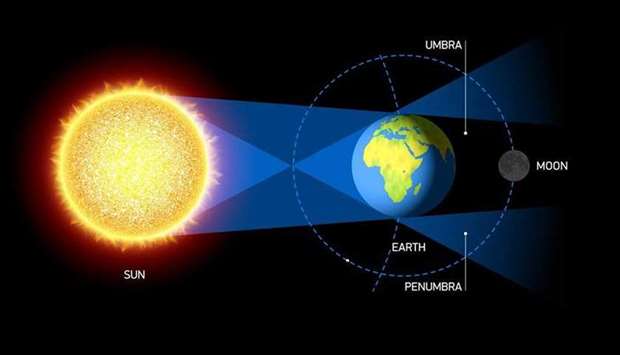The vastness of the universe itself is so wonderful that it makes Earth almost insignificant in the space. The more one tries to look into the spaciousness of the universe, the more it gets bewildered. There are, however some objects closer to the planet Earth that the scientists continue to observe and study in a bid to draw some new conclusions. There is yet much to be discovered in the solar system.
There are some natural phenomena that continue to catch the attention of the space experts and the common man in the streets: solar and lunar eclipses. The experts of astronomy keep themselves busy in making new assessments of different celestial objects and their orbits in the solar system. In their studies, the solar and lunar eclipses are very significant natural happenings.
Most recently, the world experienced annular solar eclipse that was vastly visible in Qatar as well. The astronomy experts of the country have now shared that six eclipses will take place in 2020. Almost all eclipses will be visible completely or partially in Qatar.
According to accurate astronomical calculations, the world will be able to witness six eclipses during 2020, moreover, four of them will be lunar eclipses, while other two eclipses will be solar eclipses.
Sharing the details of the celestial phenomena with Community, Dr Beshir Marzouk, an astronomer expert with Qatar Calendar House (QCH), said: “The first lunar eclipse will be on Friday, January 10, 2020; where it will be occurring during the full moon of Hijric month ‘Jumada I, 1441’, and its type will be penumbral lunar eclipse, where the Earth’s penumbra will occult 90% of full moon during maximum moment of eclipse. The residents of Qatar and other Arab countries will be able to observe the first penumbral lunar.”
He added, “The second lunar eclipse will occur on Friday, June 5, 2020, where it will take place during full moon of Hijric month ‘Shawal, 1441,’ Its type will also be penumbral lunar eclipse, where the Earth’s penumbra will occult 57% of full moon during maximum moment of eclipse. Once again, the people living in Qatar and other parts of the Arab world will have the chance to observe all phases of this lunar eclipse.”
The expert added, “The third lunar eclipse will occur on July 5, 2020, happening during full moon of Hijric month ‘Dhu-al-Qaida, 1441.’ Moreover, its type will again be penumbral lunar eclipse where the earth’s penumbra will occult 35.5% of full moon during maximum moment of eclipse. Luckily, the inhabitants of Qatar and the Arab region will have the chance to observe all phases of this lunar eclipse.
“The last lunar eclipse of 2020 will occur on November 30, 2020 during the full moon of Hijric month ‘Rabie I, 1442.’ Its type will again be penumbral lunar eclipse, where the Earth’s penumbra will occult 83% of the full moon during maximum moment of eclipse. All the phases of the lunar eclipse will be observed by the people in and around Qatar.”
Dr Beshir added, “On the other side, the first solar eclipse of 2020 will occur on Sunday, June 21, 2020. Its type will be annular Solar eclipse. It will however be seen in the skies of Qatar as partial solar eclipse. Finally, the 2020 year will end with total solar eclipse. Moreover, it will occur on Monday, December 14, 2020. The last solar eclipse will not be seen by the people of Qatar and other Arab world countries.”

POSITIONING: The position of Sun, Earth, and Moon during lunar eclipse.
